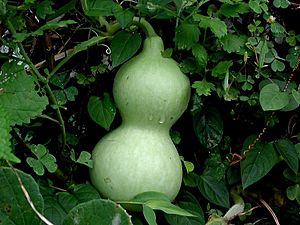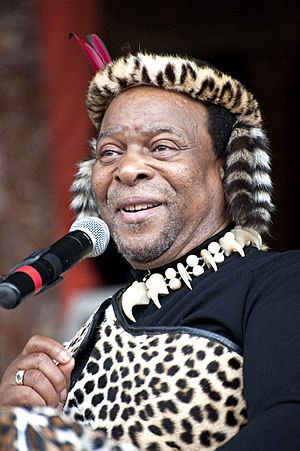Umkhosi Wokweshwama facts for kids
Umkhosi Wokweshwama is a special annual festival for the Zulu people in South Africa. It's also known as the "First Fruits festival" or the "calabash festival." This celebration happens around December, when the summer season begins. It's a time to celebrate the first harvest of the year.

Contents
About Umkhosi Wokweshwama
This important festival takes place at the Enyokeni Royal Palace in Nongoma, KwaZulu-Natal. The Zulu King leads the entire event. He performs a special tasting ceremony. This shows that the new crops are ready to be eaten. The festival ends when the King breaks a calabash (a type of gourd). This action means that everyone can now enjoy the fresh fruits of the harvest.
What Happens at the Festival?
Many young men take part in Umkhosi Wokweshwama. It is similar to how young women participate in the Umkhosi woMhlanga (Reed Dance). A special black bull is part of the ceremony. Young men work together to kill the bull without weapons. This happens in the King's royal enclosure, called a kraal. This act is seen as giving the bull's strength to the King. It is a very old and important tradition for the Zulu people.
History of the Festival
The festival has a long history. Long ago, King Shaka made it more important for the military. It included a gathering and parade of soldiers. The British colonial government banned the festival after the Anglo-Zulu War in 1879. The last festival before the ban was in 1877–78.
The father of the current King, the late King Goodwill Zwelithini kaBhekuzulu, brought the festival back in 1990. This allowed the Zulu people to continue this important cultural tradition.
Similar Celebrations
Other groups have similar harvest festivals. The Kingdom of Swaziland has a festival called Incwala. This is part of a larger group of Nguni "First Fruit" traditions in Southern Africa. Some parts of the Zulu festival have even inspired other celebrations. For example, the modern African-American holiday of Kwanzaa was partly inspired by this Zulu festival.
 | James Van Der Zee |
 | Alma Thomas |
 | Ellis Wilson |
 | Margaret Taylor-Burroughs |


